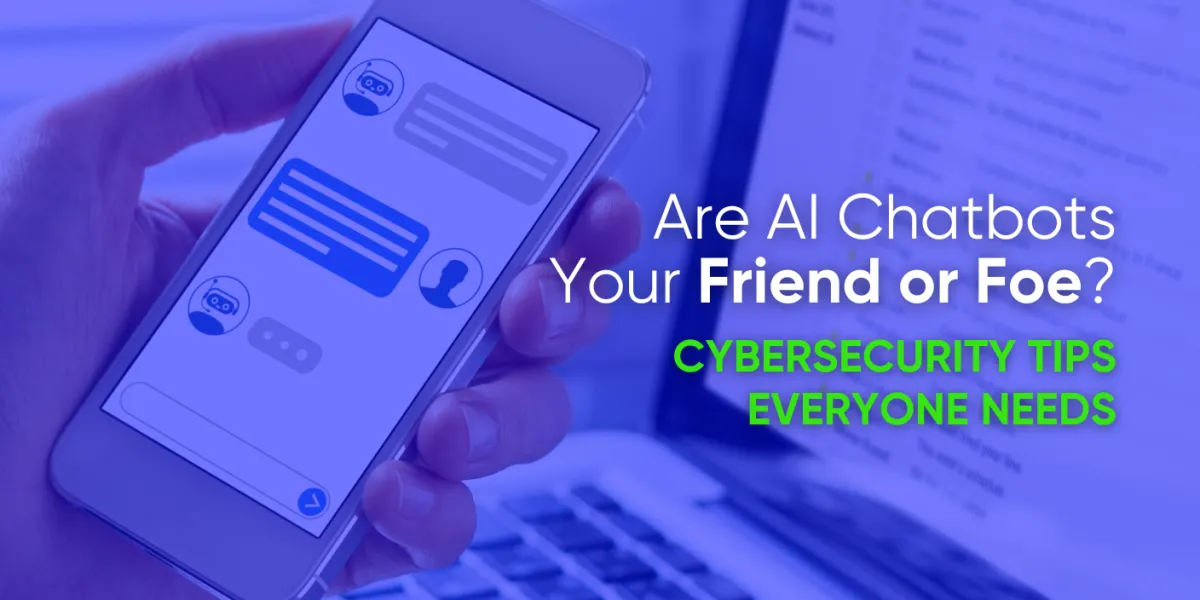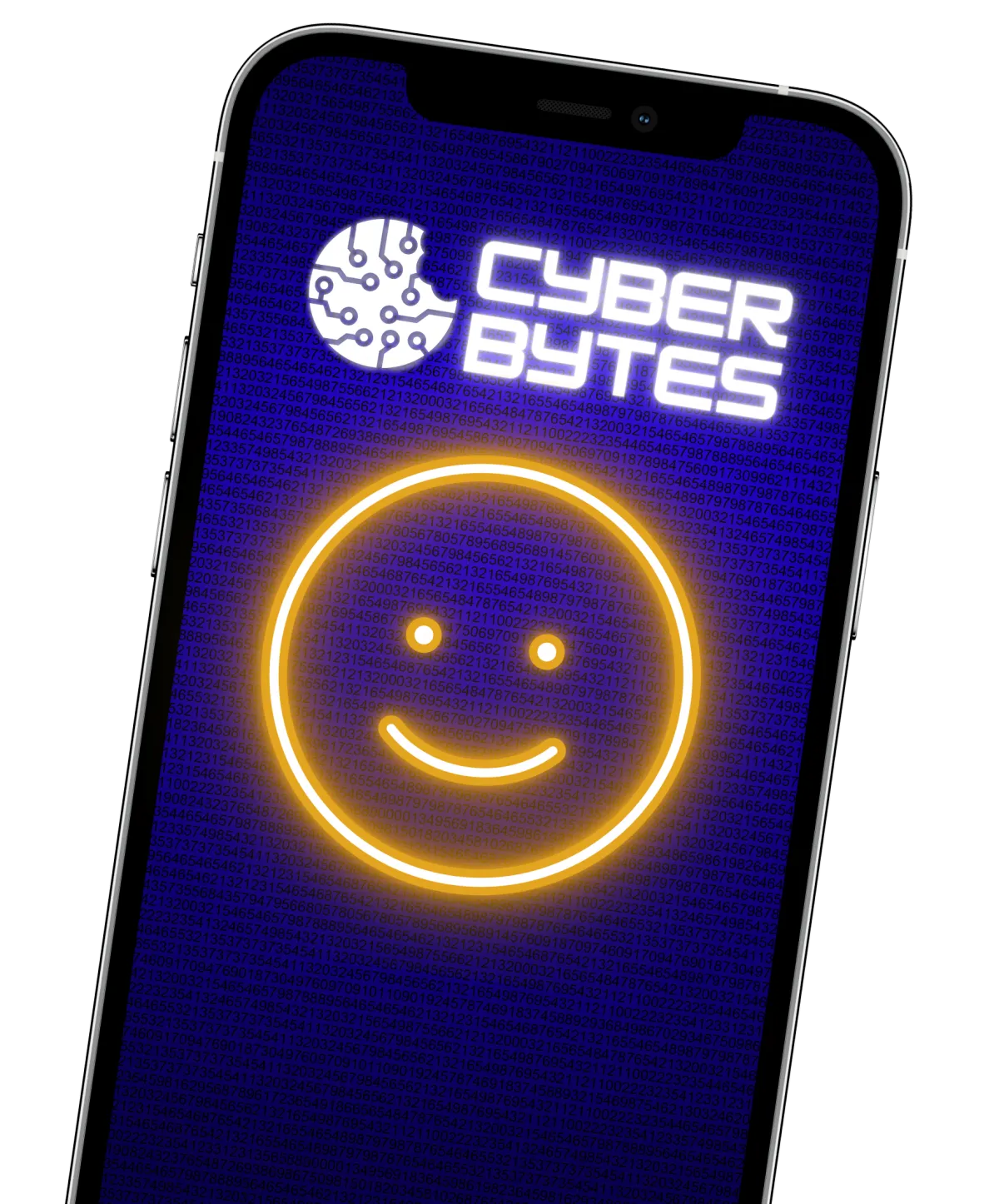You are what you click!
Learn how to make cybersecurity your way of life in an easy and guided way.
You are what you click!
Become Cyber savvy
EXPLORE BLOG BELOW
You are what you click!
Become Cyber savvy
You are what you click!
Become Cyber savvy
You are what you click!
Become Cyber savvy

Blog Post for May with AI Focus
Remember that time you asked a website's chat window if your order had shipped, and it instantly popped up with the tracking number? Or maybe your child tried a virtual AI friend and came back bubbling with crazy facts they'd learned. AI chatbots are everywhere. They're friendly, helpful, and surprisingly knowledgeable. But... should we trust them completely? Are they a useful tool or a potential cybersecurity minefield? Let's dive in!
The Good: Why We Love AI Chatbots
AI chatbots offer enticing benefits that explain their popularity. They're like tireless assistants, answering questions 24/7, researching, providing customer support, and even offering companionship. This technology can be a huge time-saver, and sometimes the conversations are surprisingly entertaining.
For example, if you're running a business, a chatbot could handle basic customer inquiries, allowing you to focus on more complex tasks. If you're a parent, an AI tool could provide educational answers for your curious child, while you finish an important task. AI chatbots even have the potential to streamline internal training within companies.
But wait... what about the potential downsides? Before blindly embracing these chatty companions, we need to acknowledge the hidden risks in the AI landscape. Let's consider the not-so-good side...

The Bad – When Helpful Turns Risky
Let's face it: anything that collects information about us raises potential privacy concerns. With AI chatbots, it's sometimes unclear what data they're gathering and how it's stored or sold. Many chatbots collect user conversations for training and improving their AI models. Could that mean your personal questions or private business details are being stockpiled somewhere?
Now, let's get even more unsettling. AI chatbots are only as good as the information they're trained on. This means they can be manipulated – intentionally or not – to spread false information, push scams, or even craft phishing attacks that look deceptively convincing.
A Parent's Concern: Could children accidentally reveal sensitive family information? Could a chatbot try to lure them with too-good-to-be-true offers? Kids often don't have the same critical thinking as adults when facing digital persuasion.
A Business Leader's Worry: Even in a corporate setting, chatbots could be exploited. Could an employee be tricked into entering login credentials on a convincing but fake chatbot? Could confidential company info make its way into the wrong hands through a seemingly simple AI-powered interaction?
While the risks are real, the good news is that we don't have to avoid AI chatbots altogether. Instead, let's shift our focus towards using them smartly and safely.

The Smart – Safety Tips for Using AI Chatbots
The key to staying safe while reaping the benefits of AI chatbots is to follow the "Be I AM" principles: Be Intentional, Aware, and Mindful.
Intentional: Limit the information you share with AI chatbots. Treat them like a stranger you've just met – don't divulge private details about yourself, your family, or your workplace.
Aware: Be on guard against manipulation. If offers seem too good to be true, or an AI chatbot pushes you too hard for information, it could be a phishing attempt or scam. Trust your gut, and remember, it's okay to disengage a conversation.
Mindful: Remember that even when using AI tools, your passwords with multi-authentication 2FA remain your key defense. Use strong, unique passwords and never give them out to anyone (or any chatbot!). Be Intentional, Aware, and Mindful. Be I AM!
AI Chatbots - Handle with Care
AI chatbots are impressive tools with fantastic potential benefits. However, it's vital to approach them with a healthy dose of skepticism. They are not a substitute for human vigilance when it comes to protecting your data and staying safe online.
Remember, technology advances quickly, and while we enjoy the convenience these tools provide, it's crucial to stay one step ahead of cyber threats. By staying intentional, aware, and mindful about your interactions with AI chatbots, you can harness their power while protecting yourself and your loved ones.

Call to Action:
Share this article with a friend or family member! Let's spread awareness and help everyone stay 'cyber safe' in this age of AI.
Questions to Ponder:
Have you ever interacted with an AI chatbot where the line between human and machine blurred?
Are there instances where you'd feel completely trusting of an AI chatbot, and others where you wouldn't? Why?
What additional safeguards could make you feel more secure using AI tools in the future?
Q&A: Your AI Chatbot Cybersecurity Questions Answered
1. What are AI chatbots, and how do they work?
AI chatbots are computer programs that simulate conversation using natural language processing. They use complex algorithms to understand your queries and generate relevant responses.
2. Are AI chatbots safe to use?
AI chatbots can be helpful, but it's important to be cautious. Be mindful of the information you share, watch out for scams, and protect your passwords, even when interacting with chatbots.
3. Can hackers use AI chatbots to steal my data?
Unfortunately, yes. AI chatbots can be manipulated for malicious purposes. Be wary of chatbots that ask for sensitive information or push offers that seem too good to be true.
4. Can I trust the information provided by an AI chatbot?
It's best to verify information from an AI chatbot with other credible sources. AI can sometimes make mistakes or be fed biased information.
5. How do I protect my kids when they use AI chatbots?
Monitor kids' interactions with chatbots, teach them not to share personal details, and emphasize that anything online should be double-checked with a trusted adult.
6. Can AI chatbots be used to spread misinformation?
Yes, AI chatbots can be programmed or trained on false information, which they can then spread. Always practice critical thinking and fact-check information from any source, including chatbots.
7. Are there "good" and "bad" AI chatbots?
Most chatbots are designed for helpful purposes, but it's crucial to stay vigilant. Be wary of any chatbot making suspicious requests or trying to elicit sensitive details.
8. Should I avoid using AI chatbots altogether?
Not necessarily. AI chatbots offer benefits but being aware of potential risks and following the "Be I AM" principles (Intentional, Aware, Mindful) will keep you cyber-safe.
9. What are some red flags to watch out for when interacting with a chatbot?
Chatbots asking for login credentials, financial details, or overly personal information should raise suspicion. Also, be careful with unrealistic offers or aggressive attempts to push a product or service.
10. How can I stay updated on AI cybersecurity threats?
Follow blogs and websites focused on cybersecurity, and resources like Way2Protect® for regular information and tips.
Live Happily Ever Cyber!

Sandra Estok
Subscribe for more ways to protect what matters most to you against hackers, scammers, and Cybermonsters™
Latest blog posts:

Blog Post for May with AI Focus
Remember that time you asked a website's chat window if your order had shipped, and it instantly popped up with the tracking number? Or maybe your child tried a virtual AI friend and came back bubbling with crazy facts they'd learned. AI chatbots are everywhere. They're friendly, helpful, and surprisingly knowledgeable. But... should we trust them completely? Are they a useful tool or a potential cybersecurity minefield? Let's dive in!
The Good: Why We Love AI Chatbots
AI chatbots offer enticing benefits that explain their popularity. They're like tireless assistants, answering questions 24/7, researching, providing customer support, and even offering companionship. This technology can be a huge time-saver, and sometimes the conversations are surprisingly entertaining.
For example, if you're running a business, a chatbot could handle basic customer inquiries, allowing you to focus on more complex tasks. If you're a parent, an AI tool could provide educational answers for your curious child, while you finish an important task. AI chatbots even have the potential to streamline internal training within companies.
But wait... what about the potential downsides? Before blindly embracing these chatty companions, we need to acknowledge the hidden risks in the AI landscape. Let's consider the not-so-good side...

The Bad – When Helpful Turns Risky
Let's face it: anything that collects information about us raises potential privacy concerns. With AI chatbots, it's sometimes unclear what data they're gathering and how it's stored or sold. Many chatbots collect user conversations for training and improving their AI models. Could that mean your personal questions or private business details are being stockpiled somewhere?
Now, let's get even more unsettling. AI chatbots are only as good as the information they're trained on. This means they can be manipulated – intentionally or not – to spread false information, push scams, or even craft phishing attacks that look deceptively convincing.
A Parent's Concern: Could children accidentally reveal sensitive family information? Could a chatbot try to lure them with too-good-to-be-true offers? Kids often don't have the same critical thinking as adults when facing digital persuasion.
A Business Leader's Worry: Even in a corporate setting, chatbots could be exploited. Could an employee be tricked into entering login credentials on a convincing but fake chatbot? Could confidential company info make its way into the wrong hands through a seemingly simple AI-powered interaction?
While the risks are real, the good news is that we don't have to avoid AI chatbots altogether. Instead, let's shift our focus towards using them smartly and safely.

The Smart – Safety Tips for Using AI Chatbots
The key to staying safe while reaping the benefits of AI chatbots is to follow the "Be I AM" principles: Be Intentional, Aware, and Mindful.
Intentional: Limit the information you share with AI chatbots. Treat them like a stranger you've just met – don't divulge private details about yourself, your family, or your workplace.
Aware: Be on guard against manipulation. If offers seem too good to be true, or an AI chatbot pushes you too hard for information, it could be a phishing attempt or scam. Trust your gut, and remember, it's okay to disengage a conversation.
Mindful: Remember that even when using AI tools, your passwords with multi-authentication 2FA remain your key defense. Use strong, unique passwords and never give them out to anyone (or any chatbot!). Be Intentional, Aware, and Mindful. Be I AM!
AI Chatbots - Handle with Care
AI chatbots are impressive tools with fantastic potential benefits. However, it's vital to approach them with a healthy dose of skepticism. They are not a substitute for human vigilance when it comes to protecting your data and staying safe online.
Remember, technology advances quickly, and while we enjoy the convenience these tools provide, it's crucial to stay one step ahead of cyber threats. By staying intentional, aware, and mindful about your interactions with AI chatbots, you can harness their power while protecting yourself and your loved ones.

Call to Action:
Share this article with a friend or family member! Let's spread awareness and help everyone stay 'cyber safe' in this age of AI.
Questions to Ponder:
Have you ever interacted with an AI chatbot where the line between human and machine blurred?
Are there instances where you'd feel completely trusting of an AI chatbot, and others where you wouldn't? Why?
What additional safeguards could make you feel more secure using AI tools in the future?
Q&A: Your AI Chatbot Cybersecurity Questions Answered
1. What are AI chatbots, and how do they work?
AI chatbots are computer programs that simulate conversation using natural language processing. They use complex algorithms to understand your queries and generate relevant responses.
2. Are AI chatbots safe to use?
AI chatbots can be helpful, but it's important to be cautious. Be mindful of the information you share, watch out for scams, and protect your passwords, even when interacting with chatbots.
3. Can hackers use AI chatbots to steal my data?
Unfortunately, yes. AI chatbots can be manipulated for malicious purposes. Be wary of chatbots that ask for sensitive information or push offers that seem too good to be true.
4. Can I trust the information provided by an AI chatbot?
It's best to verify information from an AI chatbot with other credible sources. AI can sometimes make mistakes or be fed biased information.
5. How do I protect my kids when they use AI chatbots?
Monitor kids' interactions with chatbots, teach them not to share personal details, and emphasize that anything online should be double-checked with a trusted adult.
6. Can AI chatbots be used to spread misinformation?
Yes, AI chatbots can be programmed or trained on false information, which they can then spread. Always practice critical thinking and fact-check information from any source, including chatbots.
7. Are there "good" and "bad" AI chatbots?
Most chatbots are designed for helpful purposes, but it's crucial to stay vigilant. Be wary of any chatbot making suspicious requests or trying to elicit sensitive details.
8. Should I avoid using AI chatbots altogether?
Not necessarily. AI chatbots offer benefits but being aware of potential risks and following the "Be I AM" principles (Intentional, Aware, Mindful) will keep you cyber-safe.
9. What are some red flags to watch out for when interacting with a chatbot?
Chatbots asking for login credentials, financial details, or overly personal information should raise suspicion. Also, be careful with unrealistic offers or aggressive attempts to push a product or service.
10. How can I stay updated on AI cybersecurity threats?
Follow blogs and websites focused on cybersecurity, and resources like Way2Protect® for regular information and tips.
Live Happily Ever Cyber!

Sandra Estok
Subscribe for more ways to protect what matters most to you against hackers, scammers, and Cybermonsters™
Stop Hackers, Scammers and Cybermonsters in their tracks.
Take charge of your Cyber Life today!
Push Cybermonsters away from your private data.
Subscribe to my newsletter about cybersecurity and cyber safety. New issues every Tuesday.




